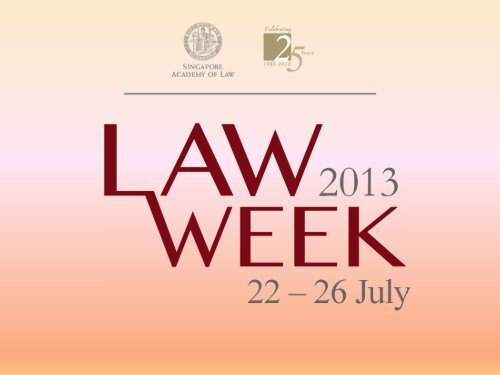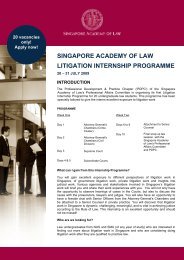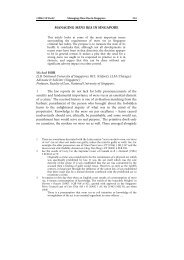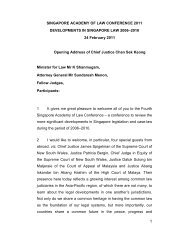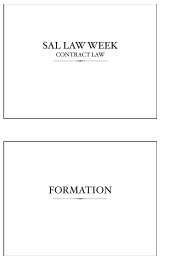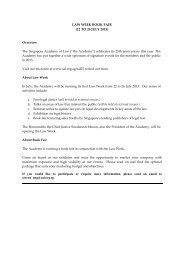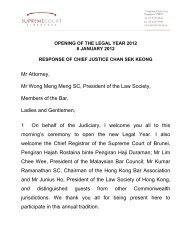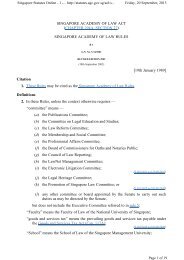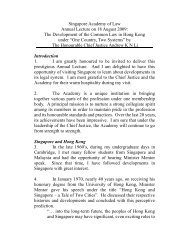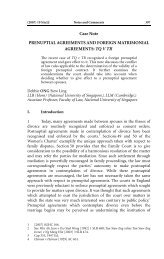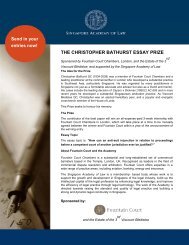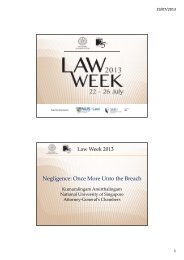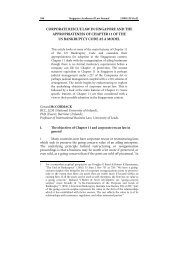Mediation - Leslie Chew - Singapore Academy of Law
Mediation - Leslie Chew - Singapore Academy of Law
Mediation - Leslie Chew - Singapore Academy of Law
Create successful ePaper yourself
Turn your PDF publications into a flip-book with our unique Google optimized e-Paper software.
<strong>Mediation</strong> inthe Subordinate CourtsSenior District Judge <strong>Leslie</strong> <strong>Chew</strong>Subordinate Courts
<strong>Law</strong> Week 2013Senior District Judge <strong>Leslie</strong> <strong>Chew</strong> wasappointed a District Judge in the SubordinateCourts in 2007. Previous to that he was apracticing lawyer for 26 years at the commercialbar. He was appointed a Senior Counsel in 2000.He was among the first to be trained in <strong>Mediation</strong>and is currently on the panel <strong>of</strong> the <strong>Singapore</strong><strong>Mediation</strong> Centre. He is also a Pr<strong>of</strong>essorialFellow <strong>of</strong> the <strong>Singapore</strong> Institute <strong>of</strong> LegalEducation where he teaches the <strong>Law</strong> andPractice <strong>of</strong> Arbitration as part <strong>of</strong> the BarExaminations. He also continues to be amember <strong>of</strong> the Liquor Licensing Board,Requisition <strong>of</strong> Resources Compensation Boardand the Land Appeals Board.
Current <strong>Mediation</strong> Initiatives• <strong>Mediation</strong> for Non‐writ Low ValueClaims• Compulsory Court Dispute Resolution(CDR) under Pre‐Action Protocols• Presumption <strong>of</strong> ADR• Modes <strong>of</strong> ADR• Costs implications for non‐compliance<strong>of</strong> Practice Directions• Associate Mediators’ Scheme
<strong>Mediation</strong> for Non‐writLow Value Claims• Low value NIMA cases below $3,000 :Claims have to be lodged with the Financial Industry Disputes ResolutionCentre Ltd (FIDReC) for mediation before adjudication.[Pre‐action protocol for management <strong>of</strong> low value NIMA cases by FIDReC]• Small Claims Tribunal for quantum $10,000 and below or $20,000 byconsent <strong>of</strong> parties for the following types <strong>of</strong> cases: [See s5 & 17 <strong>of</strong> SCT Act](a) any claim relating to a dispute arising from any contract for the sale <strong>of</strong>goods or the provision <strong>of</strong> services;(b) any claim in tort in respect <strong>of</strong> damage caused to any property (exceptmotor vehicle); and(c) any claim relating to a dispute arising from any contract for the lease <strong>of</strong>residential premises that does not exceed 2 years.‐ After a claim is filed at the Small Claims Tribunals, both parties arerequired to attend a consultation before the Registrar <strong>of</strong> the Tribunals formediation. In certain cases, mediation may also be conducted by aVolunteer Mediator. When the dispute cannot be resolved amicably throughmediation, the matter will then be fixed for hearing before a Referee.
What happens when a writ is filed?
Our philosophy on the use <strong>of</strong> ADR• Our vision is for Alternative Dispute Resolution(ADR) to provide litigants with a variety <strong>of</strong> DisputeResolution processes.• ADR and the trial process are different waysto resolve disputes• A holistic judicial system should providelitigants access to both modes <strong>of</strong> resolvingdisputes.• Part IIIA <strong>of</strong> Practice Directions
Court ADR in <strong>Singapore</strong>-PhilosophyGenesis for Court ADR“Unlike some other jurisdiction where [AlternativeDispute Resolution] had its genesis as a diversionarymeasure to deal with backlogs and delay, ourmotivation was different as these problems wereabsent…<strong>Singapore</strong>'s society and economy are builton a network <strong>of</strong> social and business relationships. Itwill be beneficial for all to build long term relationshipsthat can survive disputes. We are therefore startingby encouraging the use <strong>of</strong> mediation as a nonconfrontationaland less costly process <strong>of</strong>settling problems in terms <strong>of</strong> time, money andmore importantly, relationships”- Former CJ Yong Pung HowOfficial Opening <strong>of</strong> the <strong>Singapore</strong> <strong>Mediation</strong> Centre(16 August 1997)
Pre-Action Protocols –Encouraging use <strong>of</strong> ADR at an early stageThere are Pre‐Action Protocols for the follow types <strong>of</strong>cases where they are sent for Court Dispute Resolution(CDR)• Non Injury Motor Accident [NIMA] cases more than$3,000 – Appendix F, Annex B <strong>of</strong> PD• Personal Injury [PI]cases – Appendix FB <strong>of</strong> PD• Medical Negligence Cases – Appendix FA, Annex A <strong>of</strong>PD
NIMA / PI Cases• Court will convene 1 st CDR session for allNIMA and PI cases approximately 8 weeks afterthe filing <strong>of</strong> the memorandum <strong>of</strong> appearance.• Process <strong>of</strong> Neutral Evaluation ‐ Indication onliability given for both NIMA and PI cases• Indication on quantum <strong>of</strong> damage also given forIndustrial Accidents• See Part IIIA sections 25B and 25C <strong>of</strong> PD
NIMA / PI Cases• If there is a settlement on liability only, partiesenter interlocutory judgment before proceedingfor Assessment <strong>of</strong> Damages Court DisputeResolution [ADCDR]• Process <strong>of</strong> Neutral Evaluation by ADCDR ‐Indication on quantum after NOAD is filed.• Low Value Claims with no claim on LEC/LFE –Fast Track ADCDR where process <strong>of</strong> filingAEICs /NOAD is skipped.• See Part IIIA, section 25E <strong>of</strong> PD
Medical Negligence• Introduced in 2006, pre-action protocol allowspotential claimants the chance to discuss their caseswith medical pr<strong>of</strong>ession or the hospitals at pre-writstage.• Approximately 4 weeks after the filing <strong>of</strong> a writ, theCourt will convene a pre-trial conference / CDR todiscuss and facilitate settlement <strong>of</strong> the claim for bothliability and quantum• Expert conferencing• See Part IIIA, Section 25D <strong>of</strong> PD
Presumption <strong>of</strong> ADR –Alternative Dispute Resolution* ADR Form to be filed together with SFD application for all othertype <strong>of</strong> cases* 2 Tracks Recommended ADR Track• claims less than $20,000; or• claims between $20,000 and $60,000 and will take more than 3days <strong>of</strong> trial. General TrackAll other casesSee Part IIIA Sections 25 and 25A <strong>of</strong> PD
Modes <strong>of</strong> ADR Court Assisted <strong>Mediation</strong> is the default ADRprocess. See Part IIIA Section 25F <strong>of</strong> PD. Premier mediation with SMC ($800 plus GST perparty)‣ Cases above $150,000‣ Parties want to have a dedicated time (oneday) and comfortable amenities to resolvetheir case fast.
Modes <strong>of</strong> ADR Neutral Evaluation suitable for• Renovation/Construction dispute• Conflicting expert evidence• Both sides believe that they have strong cases andwant to resolve the case on the assessment <strong>of</strong> merits.• See Part IIIA, Section 25G <strong>of</strong> PD LSAS <strong>of</strong>fers an arbitration scheme where• A binding decision• A quick resolution (120 days)• Parties may choose arbitrator
Fully Integrated with Court ProcessCivil RegistryCases where liability is settled but quantum isin issueCases goingdirect to trialwithoutmediationJudgment onliability obtained,quantum in issuePDRCCivil TrialCourtsCases that are not settled
Costs Implications forNon‐Compliance <strong>of</strong> Practice Directions• Powers <strong>of</strong> the Court to make orders & give directions for the just,expeditious & economical disposal <strong>of</strong> proceedings• Order 34A rule 1“1. —(1) Notwithstanding anything in these Rules, the Court may, at any time after thecommencement <strong>of</strong> any proceedings, <strong>of</strong> its own motion direct any party or parties to thoseproceedings to appear before it, in order that the Court may make such order or givesuch direction as it thinks fit, for the just, expeditious and economical disposal <strong>of</strong> thecause or matter.(1A) Where the Court makes orders or gives directions under paragraph (1), it may takeinto account whether or not a party has complied with any relevant pre-action protocol orpractice direction for the time being issued by the Registrar.(2) Where any party fails to comply with any order made or direction given by the Courtunder paragraph (1), the Court may dismiss the action, strike out the defence orcounterclaim or make such other order as it thinks fit.(3) The Court may, in exercising its powers under paragraph (1), make such order as tocosts as it thinks fit.(4) Any judgment, order or direction given or made against any party who does notappear before the Court when directed to do so under paragraph (1) may be set aside orvaried by the Court on such terms as it thinks just.” [Emphasis added]
Costs Implications forNon‐Compliance <strong>of</strong> Practice Directions• Imposition <strong>of</strong> costs sanction unless goodreasons are given• Order 59 Rule 5Special matters to be taken into account in exercising discretion (O. 59, r. 5)“5. The Court in exercising its discretion as to costs shall, to such extent, ifany, as may be appropriate in the circumstances, take into account —(a) any payment <strong>of</strong> money into Court and the amount <strong>of</strong> such payment;(b) the conduct <strong>of</strong> all the parties, including conduct before and during theproceedings;(c)the parties’ conduct in relation to any attempt at resolving the cause ormatter by mediation or any other means <strong>of</strong> dispute resolution; and(d)in particular, the extent to which the parties have followed any relevant preactionprotocol or practice direction for the time being issued by the Registrar.”[Emphasis added]
Associate Mediators’ Scheme• Commenced in 2009 in partnership with SMC and <strong>Law</strong>Society Pro Bono Services Office• Mediators are trained accredited jointly by SMC &SubCts• Most <strong>of</strong> the cases mediated are Civil cases amountingto $30k or less• Regular training & sharing sessions provided• Renewable appoint <strong>of</strong> a three‐year term. Currently wehave more than 50 lawyers under this scheme.• Allow lawyers to not only the opportunity to serve thecommunity but also to enhance their pr<strong>of</strong>essionaldevelopment.
FUTURE DEVELOPMENTS FOR ADR• Primary Justice ProjectAnnounced by the Honourable the Chief Justice Sundaresh Menon atthe Subordinate Courts Workplan 2013 on 1 March 2013. TheSubordinate Courts will embark on the Primary Justice Project incollaboration with the <strong>Law</strong> Society and other justice stakeholders.Envisages a future where there is an interim step between self‐helpand commencing action in the courts.To build up a corps <strong>of</strong> well‐trained “primary justice lawyers” who canprovide paid, basic legal services geared towards settlement throughinstitutionalising early referrals <strong>of</strong> disputes to ADR before a case isfiled in court. <strong>Law</strong>yers will play a critical role in helping parties toresolve minor matters in most cases without commencing an action.To develop a culture <strong>of</strong> amicable dispute resolution in our society withlawyers playing a critical and front‐line role.
PRIMARY JUSTICE PROJECTKey Features
PRIMARY JUSTICE PROJECT• The target category <strong>of</strong> litigants for this scheme are: “Sandwiched Class” (do not meet the Means orMerits Test <strong>of</strong> the Legal Aid Bureau but cannot affordlegal fees <strong>of</strong> full trial); Small value civil claims <strong>of</strong> less than $60,000 but notwithin the jurisdiction <strong>of</strong> the Small Claims Tribunals;E.g. contentious probate, consumer claims, personalinjuries claims, employment disputes, insurancedisputes, defamation, MCST disputes, tenancy disputesetc. Divorce matters with most ancillary matters close tosettlement (target to file DCO together with writ).Generally for marriages without children or withchildren above the age <strong>of</strong> majority.
(a)FUTURE DEVELOPMENTS FOR ADR• Witness ConferencingTo enhance expert witness conferencing at trials and AD hearings,thus reducing the no. <strong>of</strong> hearing days for parties.Target cases will be DC Suit cases under the following categories:Cases where outcome would turn primarily on expert issue(s);(b) Cases where expert testimonies are expected to take [2] or more days;(c)Renovation and construction cases;(d) Cases involving medical opinions (including PI and medicalnegligence cases);(e)(f)Cases involving financial or accounting experts; andHigh value NIMA claims involving total loss <strong>of</strong> vehicles.
FUTURE DEVELOPMENTS FOR ADR• E‐<strong>Mediation</strong> at SCT The Small Claims Tribunals is currently exploring the possibility <strong>of</strong>alternatives to the current face‐to‐face mediation, such as mediation bytelephone, video conferencing or via an online dispute resolutionportal. These alternative means <strong>of</strong> mediation are envisaged to be an optionalprocess <strong>of</strong>fered to the parties before a Claim is filed so as to provide moreoptions and greater flexibility to them.
FUTURE DEVELOPMENTS FOR ADR• Guidebook on liability for Road TrafficAccidentsProvide a neutral evaluation guide on liability for common road trafficaccidents scenarios for LIPsEncourage early settlement between litigants and motor insurers at prewritstage, particularly the lower value claims• Simplified Trial Processes for low valueclaimsParties must take active steps to resolve the claim by direct negotiations ormediation once notice <strong>of</strong> claim is given before pursuing it formally inCourtCase Management Conference will be conducted to give parties theopportunity to negotiate a settlement or explore ADR
201322 – 26 July


